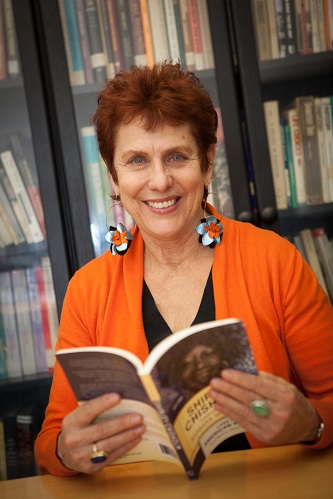Shirley Chisholm's Trials and Triumphs Captured in New Biography
Dec. 20, 2013

Professor Barbara Winslow's book, Shirley Chisholm: Catalyst for Change (Lives of American Women), was released by Westview Press on November 26, 2013.
Historian Barbara Winslow is a professor in both the School of Education and the Women's and Gender Studies Program. In 2006, she founded the Shirley Chisholm Center for Research on Women, a feminist think tank honoring the memory of the trailblazing alumna, activist, and politician. She also organized the Shirley Chisholm Project on Brooklyn Women's Activism Content to document and preserve the history of women's political activity in Brooklyn from 1945 onward. Her recently released biography, Shirley Chisholm: Catalyst for Change (Lives of American Women), provides further insight into the life of one of the most courageous and visionary leaders of our time.
How did you become interested in writing about Shirley Chisholm?
I had finished writing a book and was considering what to write next. A very good friend of mine was completing her dissertation about black women and politics in New York City, and she mentioned that she was writing on Chisholm, who went to Brooklyn College. That gave me the idea for the Shirley Chisholm Center for Research on Women. I actually spoke to Ms. Chisholm two months before she died to get permission to name the center after her. She said yes and I promised her that we would cherish it and the center would never be a disgrace to her.
And that blossomed into all of the ways the college and community memorialize her today?
Yes. I came up with the idea of the Shirley Chisholm Project on Brooklyn Women's Activism, collecting documents and interviews of people who knew her. And that grew into Shirley Chisholm Day, thanks to [New York Assemblyman] N. Nick Perry, who made it an official day which we celebrate every year at Brooklyn College. We also have Shirley Chisholm conferences. This year, the Shirley Chisholm Project was dedicated to "Shirley Chisholm, the teacher"—which is one of the reasons why I brought in Karen Lewis [president of the Chicago Teacher's Union] to be the speaker. And next year, because it's the 50th anniversary of Mississippi Summer Project (also known as Freedom Summer), we will be commemorating those individuals who went to fight for voting rights in Mississippi in the 1960s (some of whom are Brooklyn College alumni) and also honoring those who are presently fighting voter suppression in the 21st century.
Why do you think it is important that Shirley Chisholm is remembered and for her story to be told?
Until the last 30–40 years, history was always written by the people in power, by the victors. One of the many positive results of the upheavals of the Sixties was that many of us who were active went into the academy and became professors. We believed that the lives of ordinary people were as important as the lives of the rich and famous. Chisholm, by anyone's standard, would have been considered an ordinary person—if not for the forces of history and her own vision. Chisholm is the first African-American woman elected to Congress. She was the first African American and the first woman to run for the Democratic nomination for the presidency, and remains the only woman who had delegate votes and her name placed in nomination. She was also responsible for some of the most important legislation in New York state, like the Search for Education, Elevation, and Knowledge (SEEK) Program—which is what transformed the City University of New York (CUNY) so that it became as racially diverse as New York City itself.
How do you think your book differs from previous works about Chisholm's life?
This is first biography of Shirley Chisholm in 41 years. The only others were written in the 1970s before she ran for president. Chisholm wrote her autobiography, Unbought and Unbossed, and then wrote The Good Fight about the presidential election. The rest of the books about her are children's books. This is the first scholarly biography that looks at Chisholm's life historically rather than contemporaneously. Additionally, this book contains first-hand interviews with those he knew her—admirers, critics, and staffers—as well as information from her FBI file.
The thesis of this book is that Chisholm embodies and is emblematic of the post-1945 urban, liberal era. She is a remarkable symbol of the women's movement, the movement for civil rights, the immigrant experience, and the anti-war movement. I also argue in the book that Chisholm's historic run for the presidency was not necessarily quixotic. She was very strategic: She felt that if she would go into the Democratic convention with delegates, she could affect the platform and who the vice-presidential nomination should be. And she wasn't wrong. One of her supporters, Jim Pitts, who was an elected delegate, told me that this was the only time the Democratic Party stood for the abolition of capital punishment. That was Chisholm's influence.
How has Brooklyn College been supportive of your efforts?
This book would likely not exist if I didn't work at Brooklyn College. What every faculty member will say about the college is that we're here because of the students. They inform our lives. They inform our teaching. We learn from them. And when I show the Shola Lynch film, Chisholm '72: Unbought and Unbossed, to my students, I watch their faces closely. What I want to learn from them is how they see her, what they think of her speeches, what they think of her stance. They are fascinated by this petite woman who could barrel her way through the male chauvinist and racist society. She gives them the hope that even though they face a lot of discrimination—for lots of reasons, none of them any good—they have a chance.






